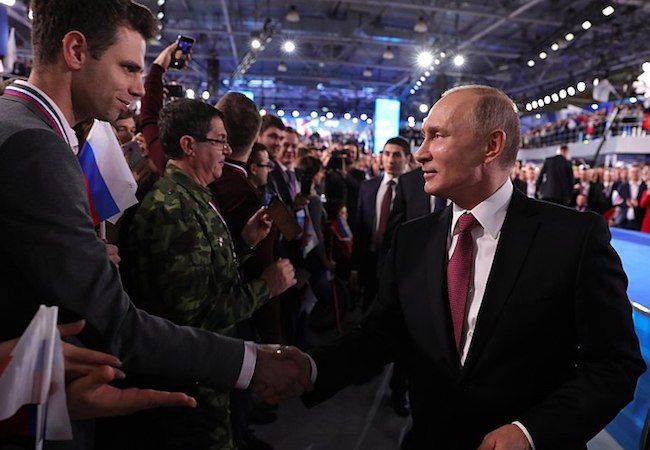Putinism in Russia: Has Vladimir Putin become the new Tsar?

By Punsara Amarasinghe and Eshan Jayawardane
2018 Russian presidential election held on 18th of March did not become a hot topic for ordinary Russians because they dwelled in a forgone conclusion about its result and current president Vladimir Putin’s overwhelming victory has exceeded beyond the expectation of Russians as Putin could clinch the victory of the presidential election in a heavy margin. Incumbent Russian president Putin won the election in 76.69% of the ballots whereas no other candidate was able to come closer to him in the election. The voting percentage acquired by Putin has been drastically increased than the last presidential election and he would continue to hold the helm of power till 2024. However fiasco of other candidates in the election has created a question whether Putin has become the new Tsar among the Russians, especially the ongoing social political trajectory in Russia indicates how profoundly its citizens are attached to a one man despite having ruled by him for 18 consecutive years. Today Russian economy has been crippled as a result of the fall of oil price in international market and the economic sanctions imposed by the European states. On the other hand the international image on Russia has been disfigured by its military involvement in Syrian civil war and annexation of Crimea from Ukraine. With all this tough circumstances, the massive victory of Vladimir Putin from the presidential election for the fourth time has marked him as an undisputed political brand among the Russians. But above all uncertainty of the country’s political future appears as a major concern to ponder.
Putin’s rise from his obscure past as a lesser known KGB officer to Kremlin was accredited with the unstable political situation envisaged by Russia after the fall of Soviet Union in 1991. Russia was left to a socio political limbo after the disintegration of USSR when country was suffering from a weak political leadership under President Boris Yeltsin. The radical reforms introduced by Yeltsin through privatizing state sector could not address the severe economic crisis in Russia during the mid-90s; besides that state bureaucracy and alleged corruption of the oligarchs around president Yeltsin had oppressed the nation. In the backdrop of such an unstable political economic situation Vladimir Putin emerged as the successor to President Boris Yeltsin after his resignation in the dawn of new millennium.
The rapid growth of economy acquired by Russia under Putin during his early years of administration could build a credibility among Russians on him, which heavily helped him to uphold his power since 2000. The previous presidential elections held in 2000, 2004 and 2012 have clearly shown the increase of Putin’s popularity in Russia. Nevertheless Russians seem to have develop an extreme form of nationalism under Putin and his rigorous endeavor to regain the lost glory of Russia in yester years have been successful as a psychological turnover of the whole nation. But On the other hand Russian foreign relations with the West in tatter in many aspects, most recently Russia has been accused by Britain for poisoning a Russian double agent lived in England under political asylum and British Prime Minister Theresa May announced plans to expel twenty three Russian diplomats identified as having links to espionage. Russia in return expelled some British diplomats and took a decision to close down British Council in Moscow. This situation aptly depicts the diplomatic storm Russia currently facing after the presidential election and ostensibly it would continue to deteriorate Russia’s ties with west badly and the eventual outcome would be Putin’s dream of moving towards grand Eurasian strategy which would bolster the closer links with Asia.
In reading Russia’s history, it becomes a salient fact to identify that most of the grand victories of Russia had gained under strong rulers and its people too had attracted towards such leaders as well. The personal based leadership policy has become the notable tendency in Russian politics since Peter the Great to Putin. In fact Vladimir Putin’s character is the embodiment of Russian power system and more or less this system will replace him one day without fundamentally reforming itself. Once Winston Churchill described Russia as a riddle wrapped in a mystery inside an enigma and Putinism prevailing in Russia is a testimony for the enigmatic nature of Russian political system. However the most problematic nature arising from Putin’s political popularity is that there is none standing in the line behind him to take over the future of Russia. It is a fact beyond dispute that entire political structure of Russia is placed on one man today. When the Tsar died in the past, his son was elevated as his successor. When the general secretary of Soviet Communist party died, standing committee filled the vacuum immediately and it would be a thoughtful or perhaps a cynical question to raise that who would take Russia if Putin dies. Today Russian people’s infatuation on Vladimir Putin has again given him the opportunity to rule world largest country for another six years, also before 1991, hardly anyone would have predicted the demise of the Soviet Union; today almost no one ventures to predict the end of Putinism. But as politics continues to be a volatile game of shadows, it would be a real riddle to solve what political destiny awaits Russia after Putin’s era.
Punsara Amarasinghe is a Doctoral Candidate in International Law at National Research University Higher School of Economics in Moscow, Russia. He holds his LL.B from University of Colombo and completed LL.M in international law at South Asian University, New Delhi. Eshan Jayawrdane is a guest lecturer at Sri Lanka Open University. He studied Sociology at Delhi University and holds his MA in International Relations from Jawaharlal Nehru University in New Delhi.




